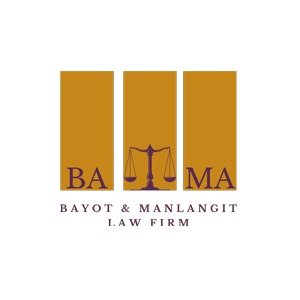Best Merger & Acquisition Lawyers in Philippines
Share your needs with us, get contacted by law firms.
Free. Takes 2 min.
Or refine your search by selecting a city:
List of the best lawyers in Philippines
About Merger & Acquisition Law in Philippines
Merger and Acquisition (M&A) law in the Philippines is a complex field governed by various legal frameworks aimed at regulating the consolidation of companies or assets. M&A activities are channels for corporate restructuring and play a significant role in strengthening competitive advantage in the business sector. The governing laws in the Philippines include the Corporation Code, the Securities Regulation Code, and certain guidelines issued by the Philippine Competition Commission (PCC). Understanding these laws is essential for ensuring compliance and achieving strategic business objectives.
Why You May Need a Lawyer
Seeking legal advice during M&A transactions is essential due to the complex legal and regulatory landscape involved. Common situations where legal help is needed include:
- Navigating regulatory requirements and securing necessary approvals from government bodies.
- Conducting due diligence to identify potential liabilities and risks associated with the transaction.
- Negotiating terms and drafting key contractual documents that protect your interests.
- Addressing compliance with antitrust, tax regulations, and foreign investment laws.
- Advising on the best corporate structure post-merger or acquisition for tax efficiency and operational benefits.
Local Laws Overview
Key aspects of local laws relevant to M&A in the Philippines include:
- The Corporation Code: Governs the formation, operation, and dissolution of corporations in the Philippines.
- The Securities Regulation Code: Regulates the issuance and sale of securities, crucial during M&A transactions involving public companies.
- Philippine Competition Act: Overseen by the Philippine Competition Commission, this act ensures fair competition and prevents monopolistic practices during mergers and acquisitions.
- The Tax Code: Outlines tax obligations and potential liabilities that might impact the structure and viability of the transaction.
- Foreign Investments Act: Governs foreign equity investments and compliance requirements for foreign entities involved in M&A in the Philippines.
Frequently Asked Questions
What is the role of the Philippine Competition Commission in M&A?
The Philippine Competition Commission (PCC) reviews mergers and acquisitions to ensure these do not result in anti-competitive practices. Transactions that meet certain thresholds must be notified to the PCC for review and approval.
Do small businesses need to comply with M&A regulations in the Philippines?
Yes, all businesses engaging in M&A activities, regardless of size, must comply with applicable regulations, particularly if the transaction may significantly impact market competition or involves foreign entities.
What are the notification thresholds for PCC review?
As of the latest guidelines, a transaction must be notified to the PCC if it meets specified thresholds for the value of assets or revenues, which are periodically updated. Legal counsel can provide the current figures.
Can foreign companies freely acquire local companies in the Philippines?
Foreign ownership is subject to restrictions depending on the industry. Certain sectors have caps on foreign equity under the Foreign Investments Act and other special laws.
What are common legal documents involved in M&A transactions?
Common legal documents include a Letter of Intent, Non-Disclosure Agreement, Sale and Purchase Agreement, Merger Agreement, and Due Diligence Reports.
How long does the M&A process typically take in the Philippines?
The duration of an M&A process can vary significantly based on the complexity and size of the transaction, regulatory approvals needed, and negotiation between parties. It typically ranges from several months to over a year.
What is due diligence and why is it important?
Due diligence involves a thorough investigation of the target company to uncover liabilities, financial condition, and potential risks. This is crucial for informed decision-making and negotiation.
Are there any tax implications in M&A transactions?
Yes, M&A transactions may trigger various tax obligations including capital gains tax, documentary stamp tax, and value-added tax, among others.
Can an M&A deal be canceled or modified post-closure?
Modifications or cancellations post-closure can be complicated and depend on the terms outlined in the agreement. Legal recourse may be possible under certain conditions such as misrepresentation or breach of contract.
Is there a difference between a merger and an acquisition in Philippine law?
Yes, in a merger, two companies legally consolidate into one entity, whereas in an acquisition, one company purchases another entirely. Legal procedures and implications may vary for each.
Additional Resources
Here are some resources that can assist individuals seeking further information on M&A in the Philippines:
- The Philippine Competition Commission (PCC)
- Securities and Exchange Commission (SEC) of the Philippines
- Board of Investments (BOI)
- Local chapters of international chambers of commerce
- Professional legal and financial advisories specializing in M&A
Next Steps
If you are considering an M&A transaction and need legal assistance, consider these steps:
- Engage a reputable law firm with expertise in M&A to discuss your objectives and receive tailored advice.
- Conduct preliminary research and identify potential target companies or acquirers.
- Ensure you understand the legal requirements and potential liabilities involved in the transaction.
- Begin the due diligence process early to avoid delays and unforeseen complications.
Taking these steps can help ensure that your M&A transaction proceeds smoothly and successfully, with compliance to all relevant legal standards.
Lawzana helps you find the best lawyers and law firms in Philippines through a curated and pre-screened list of qualified legal professionals. Our platform offers rankings and detailed profiles of attorneys and law firms, allowing you to compare based on practice areas, including Merger & Acquisition, experience, and client feedback.
Each profile includes a description of the firm's areas of practice, client reviews, team members and partners, year of establishment, spoken languages, office locations, contact information, social media presence, and any published articles or resources. Most firms on our platform speak English and are experienced in both local and international legal matters.
Get a quote from top-rated law firms in Philippines — quickly, securely, and without unnecessary hassle.
Disclaimer:
The information provided on this page is for general informational purposes only and does not constitute legal advice. While we strive to ensure the accuracy and relevance of the content, legal information may change over time, and interpretations of the law can vary. You should always consult with a qualified legal professional for advice specific to your situation.
We disclaim all liability for actions taken or not taken based on the content of this page. If you believe any information is incorrect or outdated, please contact us, and we will review and update it where appropriate.
Browse merger & acquisition law firms by city in Philippines
Refine your search by selecting a city.

















